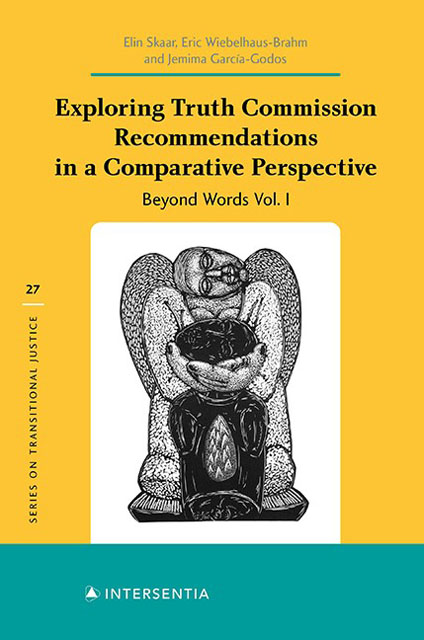Book contents
- Frontmatter
- Preface
- Contents
- List of Acronyms and Abbreviations
- List of Tables and Figures
- Chapter 1 Exploring Recommendations
- Chapter 2 Researching Recommendations
- Chapter 3 Counting and Classifying Recommendations
- Chapter 4 Formulating Recommendations
- Chapter 5 Case Studies of Implementation
- Chapter 6 A Cross-National Analysis of Implementation
- Chapter 7 Conclusions
- Appendix I Latin American truth Commission Reports
- Appendix II Information on 13 Latin American truth CommissionReports and their Recommendations
- Appendix III Excerpts from the truth Commission Recommendations Data Code Book
- Appendix IV Implementation of the Recommendations Made by 13 Latin American truth Commissions
- Appendix V Implementation Rates for Recommendations Made by 13 Latin American truth Commissions, by Category
- Appendix VI Overview of Commissioners of 12 Formal Latin American truth Commissions
- Appendix VII Latin American Countries Signatories to and Ratification of the International Convention for the Protection of All Persons from Enforced Disappearance (2006)
- Bibliography
- Index
- About the Authors
Preface
Published online by Cambridge University Press: 19 November 2022
- Frontmatter
- Preface
- Contents
- List of Acronyms and Abbreviations
- List of Tables and Figures
- Chapter 1 Exploring Recommendations
- Chapter 2 Researching Recommendations
- Chapter 3 Counting and Classifying Recommendations
- Chapter 4 Formulating Recommendations
- Chapter 5 Case Studies of Implementation
- Chapter 6 A Cross-National Analysis of Implementation
- Chapter 7 Conclusions
- Appendix I Latin American truth Commission Reports
- Appendix II Information on 13 Latin American truth CommissionReports and their Recommendations
- Appendix III Excerpts from the truth Commission Recommendations Data Code Book
- Appendix IV Implementation of the Recommendations Made by 13 Latin American truth Commissions
- Appendix V Implementation Rates for Recommendations Made by 13 Latin American truth Commissions, by Category
- Appendix VI Overview of Commissioners of 12 Formal Latin American truth Commissions
- Appendix VII Latin American Countries Signatories to and Ratification of the International Convention for the Protection of All Persons from Enforced Disappearance (2006)
- Bibliography
- Index
- About the Authors
Summary
The ambitions of those who establish truth commissions, and those who serve on them, are reflected in the names of these commissions. They often flag the term “truth ” in various combinations with justice, reconciliation, clarification, never again (Nunca Más) – even friendship. How can truth commissions possibly contribute to all these ambitious aims? It is an underlying, but seldom explicit assumption, that many of these aspirations can only be fulfilled if the recommendations made by truth commissions also are implemented. The transformative potential of truth commissions arguably lies most directly in the body of recommendations put forward in their report. Commission recommendations usually include reforms in the legal, political and social fields, and reparations of various kinds. The list is often extensive. Yet, this in itself raises questions about expectations and the possibility of implementation. That is what this book is about: the implementation of truth commission recommendations.
Over the past four decades, although estimates vary, over fifty countries have established truth commissions to investigate patterns of gross human rights violations committed by repressive regimes and/or in the context of armed conflict. More than a third of these commissions have been in Latin America, making it a leading region in this search for truth. Constructing shared memories of the past, many believe, is crucial for healing divided societies after violent conflict and repression. Apart from documenting abuses, most truth commissions make recommendations to governments. The assumption is that these recommendations, if implemented well, will help individuals and societies heal, and aid societies in the transition from violence to peace, democracy, and reconciliation. We hope this book helps generate more realistic expectations, particularly on the part of victims and affected communities.
This book is the first of two volumes which jointly provide the first systematic study of the formulation and implementation of the recommendations of thirteen Latin American truth commissions in eleven countries (Argentina, Chile, Brazil, Ecuador, El Salvador, Guatemala, Haiti, Panama, Paraguay, Peru, and Uruguay), covering a period of 35 years (1983-2017). Coming out of a research project based at the Chr. Michelsen Institute (CMI), Bergen, Norway, and funded by the Research Council of Norway (2015-2017), the two Beyond Words volumes are the first ever to provide a systematic comparative analysis of the entire universe of recommendations made by all formal (i.e., state sponsored) truth commissions in a geographical region.
Information
- Type
- Chapter
- Information
- Exploring Truth Commission Recommendations in a Comparative Perspective: Beyond Words Vol 1 , pp. v - viiiPublisher: IntersentiaPrint publication year: 2022
